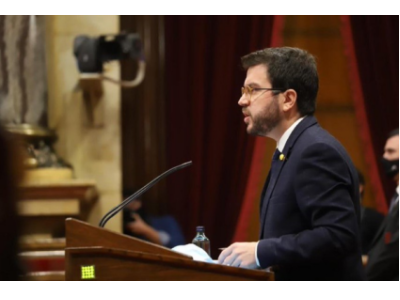- He defends the “prominence” of the public sector in “the well-being and collective progress of citizenship”
- He requests the Spanish Government to formulate a rescue plan with direct aids for the most affected sectors “as the Catalan Government has done when it was possible”

Aragonès defended the “prominence” of the public sector in “the well-being and the collective progress of the citizenship” and admitted the need for the Government to invest in health and care services “in order to take care of the people suffering due to COVID-19 crisis”. "We cannot commit the same mistakes of 2008 financial crisis; expansionary policies should be implemented, and people need to be rescued", he said.
During his intervention, the Minister of Economy and Finance of the Catalan Government also reminded that these measures are added to others already approved by the Catalan Government since the beginning of the pandemic. “COVID-19 worries us and keeps us busy every day, every hour. It is the main priority of the Government", he emphasized. Aragonès, however, regretted the lack of competences of the Catalan executive and once again urged the State Government to formulate a rescue plan with shock measures to save the economy with actions such as the moratorium of the main taxes, social security contributions, basic supplies and direct aids to the most affected sectors “as other European countries have done as well as the Catalan Government, when it was possible”. "If we had the tools of a state and we could collect taxes, we would have already done it", he claimed. However, "the Catalan Government will not evade its responsibilities: it is present now and it will be in the future", he has assured.
Reduction of personal income tax
The Parliament has validated today the Decree-Law 36/2020 including a new postponement of the implementation of the tourist tax increase for tourist establishments as well as a regional deduction in personal income tax for the lowest incomes. On the one hand, the aim is to respond to the economic difficulties of the tourism sector in Catalonia as a result of the economic effects of the pandemic; and, on the other hand, it is to protect workers who have been temporarily suspended, unemployed or have had various contracts due to the current situation caused by Covid-19.
The current personal income tax regulations state that taxpayers with an annual gross income lower than €22,000 from the same payer are not required to fill the tax return. However, if the person has two or more payers, the tax return needs to be filled in case of an annual gross income of €14,000 or higher. This is the case of workers who in 2020 will have received their salary both from their company and the State, as subsidy or unemployment rate.
To prevent these workers from being penalised when filling the tax return for 2020, the Government has created a regional deduction of personal income tax equivalent to the difference between the Catalan quota and the state quota as long as the difference is positive, that is, the Catalan Government will stop receiving the Catalan differential.
Vice-President Aragonès explained that this measure could benefit about 250,000 people in Catalonia and the Government is willing to keep it in the future, despite meaning a loss of €16.3 million for the budget for 2022.
Postponement of the tourist tax increase for tourist establishments
With regards to the tourist tax for tourist establishments, the implementation of the tax increase in the city of Barcelona is postponed until 1 June 2021. It was planned for last July, but the Parliament had already agreed on postponing it until 1 January 2021. The health situation makes it difficult to predict whether tourist establishments will operate normally in January, so the Government has agreed on postponing this increase again.